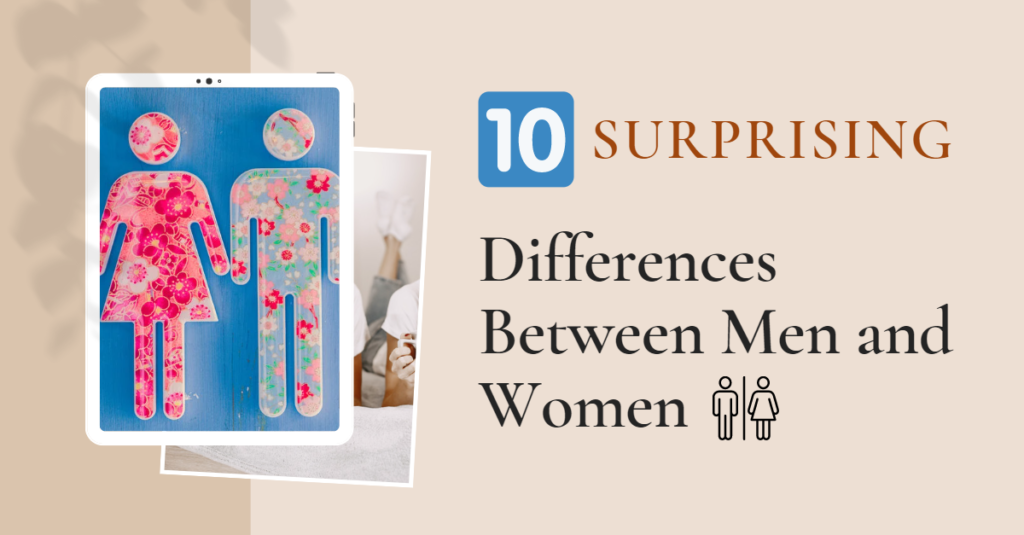10 Surprising Differences Between Men and Women
Gender differences have always been a topic of interest and discussion. Men and women have unique characteristics, both biological and psychological, that distinguish them from each other. While some of these differences are widely known, others may come as a surprise. In this article, we will be exploring ten surprising differences between men and women. From physical differences to emotional, cognitive, and social differences, we will dive deep into aspects of men and women that are not commonly discussed. Understanding these differences can help us better appreciate and respect each other’s strengths and challenges. So, let’s take a closer look at some of the fascinating and unexpected ways that men and women differ from one another.
10 Surprising Differences Between Men and Women
1. Physical Differences
While the physical differences between men and women are well-known, there are some surprising differences as well. Women have a better sense of smell than men, and men have a better sense of taste. Women are also more resistant to pain, while men have a higher risk of developing cardiovascular diseases.
2. Emotional Differences
Men and women express and process emotions differently. Women tend to be more empathetic and nurturing, while men tend to be more stoic and less likely to show their emotions. Additionally, women are more likely to experience depression and anxiety, while men are more prone to anger and aggression.
3. Cognitive Differences
Men and women have different cognitive abilities. Men tend to have better spatial reasoning skills, while women are better at verbal communication and multitasking. Additionally, women have a better memory for details, while men have a better memory for spatial orientation.
4. Social Differences
Men and women have different social behaviors and tendencies. Women tend to be more socially adept, while men are more likely to engage in risk-taking behavior. Additionally, men and women have different friendship styles, with men having larger social networks, and women having closer relationships with fewer individuals.
5. Personality Differences
Men and women have different personality traits. Women tend to be more agreeable and conscientious, while men tend to be more assertive and competitive. Additionally, women are more likely to have a fear of success, while men are more likely to have a fear of failure.
6. Leadership Differences
Men and women have different leadership styles. Women tend to be more collaborative and inclusive, while men tend to be more authoritative and directive. Additionally, women face more barriers to leadership positions and are underrepresented in leadership roles.
7. Parenting Differences
Men and women have different parenting styles. Women tend to be more nurturing and hands-on, while men tend to be more playful and less involved in daily parenting tasks. Additionally, men and women have different expectations for their children’s behavior and development.
8. Communication Differences
Men and women have different communication styles. Women tend to use more nonverbal communication, while men tend to be more direct and straightforward. Additionally, women are more likely to use language that emphasizes relationships and connections, while men use language that emphasizes status and hierarchy.
9. Career Differences
Men and women have different career aspirations and expectations. Women are more likely to choose careers that involve helping others, while men are more likely to choose careers that involve competition and achievement. Additionally, women face more barriers to career advancement, including gender bias and the glass ceiling.
1o.Aging Differences
Men and women experience aging differently. Women tend to live longer than men, but they also experience more age-related health issues, such as osteoporosis and dementia. Additionally, men and women have different expectations and attitudes towards aging, with women tending to place more importance on social connections and emotional well-being.
In conclusion, the differences between men and women are complex and multifaceted, and they can be surprising at times. Understanding these differences can help us appreciate and respect each other’s strengths and challenges. By recognizing and embracing our differences, we can work towards a more inclusive and equitable society.

My name is Rohit Vagh and I’m a content writer specializing in fashion and lifestyle. I have three years of experience in this field and have written various articles. My writing style is creative and engaging, and I strive to create content that resonates with my readers. I have a deep passion for fashion and am constantly researching the latest trends and styles to make sure my readers are up to date. I’m excited to continue my career in blogging, and I’m always looking for new opportunities in the fashion and lifestyle space.





